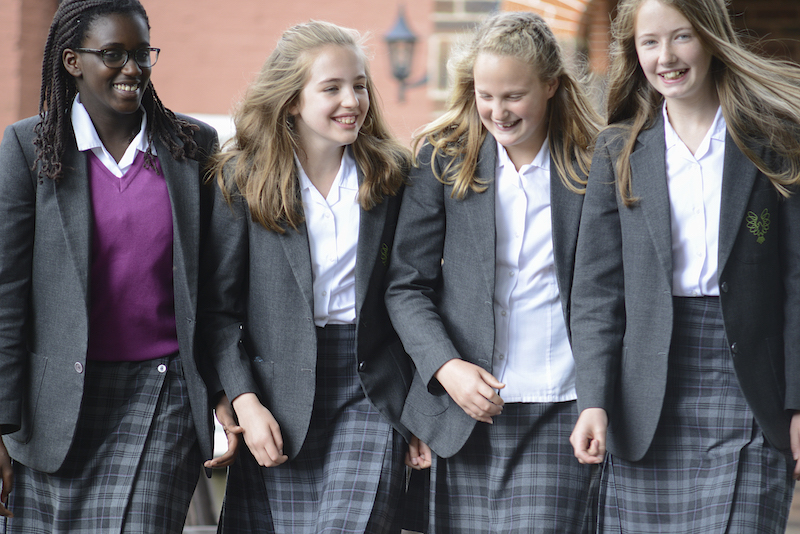Educating for tomorrow
Posted on 14th Dec 2018 in School News, International Baccalaureate, Which School?, Curriculum, A levels
Jo MacKenzie, Headmistress, Bedford Girls’ School, explains why her school offers the IB alongside A Levels
I often speak about the role schools play in empowering young people to reach their full potential. We need to educate young people to understand their role as influential and meaningful members of society. The world is becoming increasingly volatile, uncertain, complex and ambiguous, and we must develop within our students the skills and attributes to help them navigate their brave new worlds.
The call from the professional world for graduates who can think creatively, solve problems, make decisions independently, communicate and collaborate are well known. As is the need for them to have the flexibility of thinking to exploit new technologies, and to be socially and emotionally aware so they can work together across boundaries.
I want to ensure that our students are not just highly employable but that they are thinking women who are confident to choose their own paths, who are willing to initiate positive change.
It is this ambition that underpins my commitment to the International Baccalaureate (IB) philosophy, an educational vision which does not define excellence by a narrow measure of examination grades but delivers a holistic approach to life-long learning and which, at its core, has the mission of creating a better, and more peaceful world though education.
I often feel that in the UK, the IB is misunderstood; it is not just a two-year Diploma Programme bolted onto the Sixth Form but a deeply rooted teaching pedagogy developed by educational experts over the last 50 years. The IB focuses on the development of a learner profile, centred around 10 clearly defined key attributes (being principled, communicators, thinkers, open-minded, caring, risk-takers, balanced, reflective, knowledge and inquirers). Each attribute provides the foundations of truly holistic, forward thinking education in which students are encouraged to work and think independently.
At Bedford Girls’ School (BGS), we deliver an IB led approach to teaching and learning throughout the School. We are currently applying for candidacy of the Primary Year Programme (IBPYP) and offer the IB Diploma programme in the Sixth Form.
I am asked if the IB philosophy is at odds with preparation for GCSEs. GCSEs are a stepping-stone and I believe that the IB approach to learning enhances our girls’ experiences at GCSE. The ability to think crucially, to research and work independently and to articulate their ideas helps them navigate the heavy content of the GSCEs more easily. They understand the inter-disciplinary nature of their subjects, making learning more rewarding, and it prepares them for the transition to Sixth Form studies.
At BGS, we offer a dual stream Sixth Form. A Levels suits students who have very clearly defined objectives, but I suggest that every student considers the IB Diploma Programme. It is the perfect platform for preparing for university and the wider world. The breath of subjects taken (six, including Maths, English, a Science, a Language, a Humanities and one other) keeps choices and interests wide, whilst allowing students to master attributes that they started to embed. Research shows that learning a language until the age of 18 enables you to maintain it for life – so why throw away all those years of studying Spanish until 16, for just another 18 months of study? The ability to communicate with fluency in another language is a life skill that sets graduates apart. Likewise, I cannot think of a day where I do not use Maths and English in my professional and personal life, the longer we practise the skills associated with these subjects such as critical thinking, looking at a question analytically and problem solving, the more fluent we become.
In addition, the wider core elements of the IB Diploma are equally as important; all students study the Theory of Knowledge (vital in the world of fake news), undertake compulsory Community and Service projects and write an independent 4,000 word essay. These elements help students gain a greater understanding of the world around them and, vitally, teach them how to reflect on their own strengths and weaknesses.
The IB Diploma still encourages young people to follow their passions but it provides them with a framework in which other subjects support those passions. The truly independent nature of the learning and the flexibility of the curriculums creates bespoke programmes of study in which students can really flourish. They are practising the skills they will need to be successful in life in a nurturing environment with teachers who understand them. The success of the IB Diploma programme is demonstrated in the competitive offers received from excellent universities and the shape of the career paths that IB Diploma graduates follow.
As we are once again are surrounded by headlines about shifting grade boundaries, harder exams and unemployable graduates I think it is important to reflect on the true purpose of education and to ensure that we are not defining students by quickly outdated grades and letters, but by the life-long contribution they can make to enrich their worlds.
Bedford Girls’ School is an independent girls’ school for students from age 7–18.